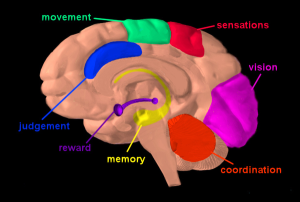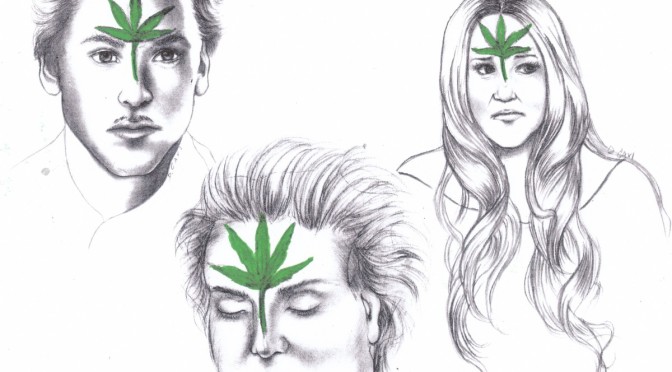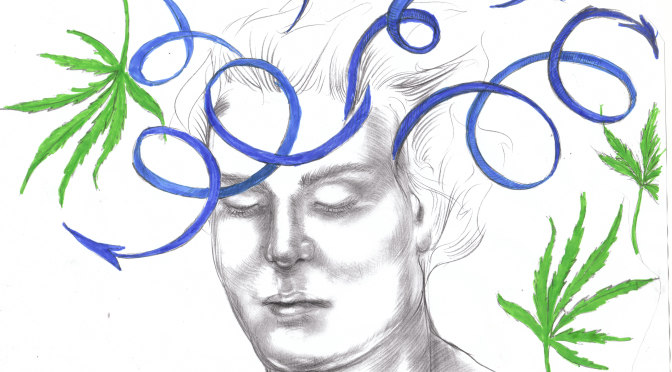Read Part 1, Part 2, Part 3 and Part 4 of The Unraveling of Ryan. Permission is required to reproduce the story. Names are changed, but details are accurate.
As I was writing this story, Leah texted me from her husband’s bedside at Cedars-Sinai Hospital: “LA Times, front page article, ‘Cannabis Hedge Funds Rush to Join Green Rush.’” We both wanted to vomit. Our two sons are casualties of this “green rush” movement, a movement to profit from making today’s highly potent strains of marijuana — at the expense of our youth….and their families. We will never address America’s mental health crisis until we accept that marijuana is the trigger that starts too many young lives unraveling.
Leah’s husband, Lee, suffered a major medical crisis, as if losing their 20-year-old son 32 months ago to suicide wasn’t enough for the family. Ed and I met Lee and Leah in the grief series; the four of us share a special bond. We do 5K walks annually in memory of our sons. On Mother’s Day, we took our families to Ojai together.
The Tragedy of Brandon
Leah said to our group back in 2012, “My son died of mental illness.” I didn’t say much, initially, but as the story unfolded and there was no history of psychosis in either family line, I thought marijuana had somehow played a role. I followed a hunch and began asking more questions. She looked at Brandon’s journals and saw his entries. “Am I having drug withdrawals?” he asked, trying to explain his racing thoughts. When he had to be hospitalized, he was convinced his lungs weren’t working.
Brandon died of suicide after being released from a three-day psych hold while experiencing psychotic symptoms tinged with mania (Guess what drug he had stopped using two weeks before entering the hospital…that’s right– cannabis). Despite telling numerous people in the hospital that he had just stopped marijuana use, none of the hospital staff raised a red flag that he was experiencing drug withdrawal symptoms. After Brandon left the hospital, he was convinced he needed a lung transplant despite doctors telling him there was nothing wrong with his lungs. He felt his breathing wasn’t right and was convinced he had caused it because he hadn’t stopped smoking cigarettes.
Brandon had become manic about four months earlier while smoking pot. When his mom expressed concern that he was becoming addicted, he just laughed because pot was a natural herb, not part of big drug companies making big $. Unfortunately Leah wasn’t aware that it’s best to come off pot gradually, under supervision. Unless psychiatrists are also certified for addiction treatment, they often don’t recognize marijuana withdrawal. Brandon had taken it upon himself to get a “medical marijuana” card, because he was having “anxiety.” Leah didn’t mind at the time, despite Brandon’s youth and undeveloped brain. As long as a doctor authorized it, she reasoned that it must be safe and legitimate. Before that time, he was using synthetic marijuana, which had alarmed her.

How Marijuana Becomes the Problem
Sorry, but I want to share what I truly believe is happening in every town across America, not just to my son, to Lee/ Leah’s son. If Leah and I hadn’t met, she would have accepted “Brandon died of a mental illness.” Rather than telling our children they should avoid having children and blaming it all on faulty genes, as some medical practitioners would advise, consider the environmental effects like marijuana. I think you should advise any child, teen or young adult to practice optimal brain health and avoid all substances that strongly alter the brain. The medical evidence is the marijuana manipulates the brain more than any other drug.
Before my son had his first psychotic episode in 2009, he suffered a terrible knee injury in a boating accident that same year. It required knee surgery and 9 months of physical rehab. It’s likely that Ryan started using a lot more marijuana to treat “pain” just as the medical marijuana advocates suggest — without giving any regards to proper dosing, strength and time intervals that a pharmacy is required to give. He was living with his fiancée at the time, so we were not aware of this choice, or that he had already been using marijuana for about three years. The accident, surgery and pain were the perfect excuse for him to use a lot more marijuana–plus he wouldn’t take the pain meds because they gave him nausea. Pot was apparently the treatment he chose, but we didn’t know it.
So the pattern emerges–using marijuana for a few years, increase the usage for “medical” reasons (in this case an accident followed by surgery and pain), and, then at some point — psychosis.
Close to Home: Amanda Bynes

Another example of the marijuana – psychosis pattern is former child star Amanda Bynes. She went to the same high school as my son; they were born in the same year, but one year apart in school.
Last year she was in treatment at the same psychiatric hospital in Pasadena where Ryan had been at one time. I don’t know her or her parents, but I heard she had some excellent treatment there (wish my son had been treated as well). Afterwards, her parents had a one-year conservatorship for her. Her mother asserted that the effects of marijuana were her main psychiatric problem, not bipolar or schizophrenia, as had been a rumored.
Amanda Bynes did well and looked amazing during most of 2014, until her parents’ conservatorship ended. Then in late summer, when the hold had ended, Amanda had some episodes and accused her father of terrible things. How could that young woman, who had heard that THC alters brain chemistry while in rehabilitation, return to using pot again? The relapse speaks volumes as to how addictive marijuana really is, and how marijuana use alters brain chemistry.
Like Amanda Bynes, Ryan seemed completely healthy to us after his “first episode” of psychosis. Both Amanda Bynes and Ryan went back to the same drug that damaged their young minds. No one knows which brains will unravel with marijuana. Is the risk worth it for anyone? In this country, I’ve found a few psychiatrists, Dr. Stuart Gitlow of Rhode Island, Dr. Christian Thurstone in Denver, Dr. Thomas Carter in Seattle, and some psychologists, who understand the link between marijuana use and mental health problems. Mental health treatment and addiction treatment need to be aligned more closely. A Postscript describes when and how to stop these problems.
The Unraveling, Part 3: Temporary Mental Instability vs Bipolar I
(Read Part 1 and Part 2. Permission required for reprinting) After Ryan’s death, I remembered reading many years ago in a magazine about Margaret Trudeau, then wife of the Canadian Prime Minister Pierre Trudeau. She was in her 20s, partied with socialites, and also suffered psychotic breaks. Each time she referenced her use of marijuana as the trigger for those episodes. I’ve since read current articles, and she continues to share. For her, marijuana led her into “madness.” It was much later that she was diagnosed with bipolar disorder. It’s hard for me to accept her son, Justin Trudeau, wanting to have the same position his father held. He’s a proponent of pot, despite knowing his mother’s mental health was so affected by marijuana. It speaks volumes on how great the opposition to promoting the truth about this drug!
Ryan was not helped to understand why his brain lost touch with reality under the influence of THC–this is the “elephant in the room.” The fact that hospitals don’t consider marijuana a factor in the picture of mental health is a tragedy. We need every researcher, past and present, across the globe, who understands the truth about what pot does to young brains to stand up in solidarity.
The experience of Great Britain was that it decriminalized marijuana, saw a spike in mental illness as a result of loosening the law, and then tightened their laws again. Canada has website on the cannabis-psychosis-schizophrenia link. The US, on the other hand, is not noticing its problem, or influenced by the marijuana financiers, is refusing to see that so many young people who are addicted to it are also having psychiatric problems. I believe the psychiatry community has failed to connect the dots, ignoring the facts of today’s cannabis – so much stronger than when they were in school, or even 10 years ago.
The Lancet Journal of Psychiatry’s recent article points to a sevenfold risk of suicide for teens who use marijuana.
The second break happened 18 months after the first one, but this time I pre-arranged for Ryan to receive drug rehabilitation at a different hospital. The hospital in Pasadena gave the ‘green light’ for rehab. We paid $12,500 up front and Ryan’s PPO would insure the rest. His uncle and grandfather came, too, for support. Less than 24 hours after admittance, the staff coerced Ryan to their locked unit, where he was warehoused for 13 days with anti-psychotics exceeding the FDA limits.
The staff asked us several times: “Could Ryan have dropped acid? He doesn’t seem like our bipolar patients.” Once again his toxicology report came up positive (+) for THC. Again, in 2011, just like 2009, no one believed marijuana could cause this effect.
By now, we realized that our son’s drug problem was with weed and that he had relapsed with weed, but he never got a shot at the drug rehab for which we had already paid.
Ryan was “dumped” from their unit on the 13th day. The insurance refused to pay for it, perhaps after reading the notes of how much worse Ryan had become inside the hospital unit. Why are insurance companies allowed to have so much influence on a patient’s treatment when they don’t have expertise? He was drugged mercilessly into just a state of stupor. It was an endless nightmare for our son and for his family.
Ryan was taken off the last anti-psychotic at the first follow-up visit with the same psychiatrist because he appeared normal, compared to his state during hospitalization. However, he was still actively psychotic at that one week follow up. (I had stopped Haldol when he came home, as I was horrified my son had been receiving Haldol round-the-clock. Of course, at 6’4”, Ryan was intimidating. He had never become violent, but he tried to escape several times, realizing he had been tricked from the open unit into the locked unit.)
Coming Home Again
Ryan was hit with a personal betrayal at the same time–which just leveled him. Yet, with love and support of our family, he emerged once again from psychosis 10 weeks later. It came within the same time frame as the first episode, probably not a coincidence. This time it happened without medications, and I am suspicious that the medicines didn’t really affect his state of mind coming off psychosis after the first episode.
Ryan stayed with the Ivy League psychiatrist after coming out of psychosis for several visits. He drove all the way to his office in Pasadena, then had to wait up to 1 1/2 hours, as he piled in patients for the 15-minute check-in. I always hoped Ryan would invite me to go with him, but he didn’t. On the last visit, Ryan came home and announced “Mom, I’m not going back to see him because he never takes his head out of the computer, and doesn’t even look at me.”
After my son died, I subpoenaed his records only to find many days of nursing notes documenting: “Please call my mom she’ll know how to help me.” “I can’t stay in here like the last time, you don’t know what happened to me there.” But no one called me or told me despite my calling twice a day and visits every night.
During the 2nd hospitalization, I believe the massive anti-psychotics administered threw him into full-blown psychosis, as compared to the mild state of psychosis at the time he entered to get drug rehab. Drugging a young person into such a state of stupor, and then stopping medication upon discharge, surely that plays havoc on the young brain – already under siege from the effects of THC.
There are families whose kids died from drug overdoses, but began their drug usage with pot. There are those who have children hopelessly addicted to marijuana and there are those of us whose children die from the consequences of marijuana usage. All of us are stymied by a cover-up of the marijuana-mental illness link, and the fact that mental health treatment doesn’t adequately connect with substance abuse and addiction treatment. Follow our posts by email to receive part 4 and part 5, to be published in December.


